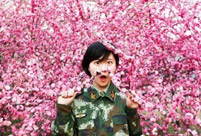


During a joint press conference with his Cambodian counterpart Prak Sokhonn on Friday, April 22, 2016, Chinese Foreign Minister Wang Yi says the Philippines' claims relating to China's territory sovereignty and maritime rights should evidently be excluded from a compulsory arbitration. [Photo: fmprc.gov.cn]
Chinese Foreign Minister Wang Yi said on Friday that the Philippines' attempt to pressure China over an arbitration of maritime disputes is "either political arrogance or legal prejudice."
"There is ample legal basis for China not to participate in or accept the unilaterally-initiated process," he told a joint press conference with his Cambodian counterpart Prak Sokhonn in Phnom Penh, capital of Cambodia.
The UN Charter and international law advocate peaceful settlement of disputes through dialogue and negotiation, and the UN Convention on the Law of the Sea (UNCLOS) also respects the dispute settlement procedure chosen by the parties themselves.
China has insisted that the South China Sea disputes should be resolved peacefully through negotiations between the parties directly concerned, Wang said.
"So China is exercising its legitimate right to reject a compulsory arbitration," he added.
The Chinese top diplomat noted that China made a declaration that excludes a compulsory arbitration in 2006 under the Article 298 of the UNCLOS.
Manila unilaterally initiated an arbitration case against China over the maritime disputes at an international tribunal in The Hague in early 2013 under the UNCLOS.
"The Philippines' claims relating to China's territory sovereignty and maritime rights should evidently be excluded from a compulsory arbitration," Wang said.
Under the Article 4 of the Declaration on the Conduct of Parties in the South China Sea (DOC), signed by China and ASEAN countries, the disputes should be resolved through consultations and negotiations by parties directly concerned.
China's rejection of a compulsory arbitration is actually a fulfillment of its responsibilities and obligations of the DOC, Wang said.
Therefore, China's position on the arbitration is in compliance with international law and the norms of international law of the sea, he said.
The Philippines' unilateral move has violated the common practice that concerned parties should reach an agreement on handling their disputes before seeking an arbitration, as well as Manila's commitment to a negotiated solution to disputes made in bilateral documents, said the Chinese foreign minister.
The Philippines has also breached the Article 4 of the DOC it has signed that territorial and jurisdictional disputes should be resolved through consultations and negotiations by parties directly concerned.
"Manila's unilateral action is actually a distortion and abuse of the international arbitration mechanism," he added.
 The evolution of J-10 fighter
The evolution of J-10 fighter Top 10 Asian beauties in 2016
Top 10 Asian beauties in 2016 What's happening in Xisha Islands?
What's happening in Xisha Islands? When female soldiers meet flowers
When female soldiers meet flowers North Sea Fleet conducts drill in West Pacific Ocean
North Sea Fleet conducts drill in West Pacific Ocean Old photos record the change of Sichuan over a century
Old photos record the change of Sichuan over a century Breathtaking aerial photos of tulip blossoms in C China
Breathtaking aerial photos of tulip blossoms in C China Horrific: Pit swallows 25 tons of fish overnight
Horrific: Pit swallows 25 tons of fish overnight Vietnamese Su-30 fighters fly over Nanwei Island in South China Sea
Vietnamese Su-30 fighters fly over Nanwei Island in South China Sea Top 20 hottest women in the world in 2014
Top 20 hottest women in the world in 2014 Top 10 hardest languages to learn
Top 10 hardest languages to learn 10 Chinese female stars with most beautiful faces
10 Chinese female stars with most beautiful faces China’s Top 10 Unique Bridges, Highways and Roads
China’s Top 10 Unique Bridges, Highways and Roads Great service or too much
Great service or too much Reality show sparks anger after endangering relics
Reality show sparks anger after endangering relics Relocated farmers not provided government services
Relocated farmers not provided government services ‘Leftover Women’ don’t want to wear stereotyped labels, even proudly
‘Leftover Women’ don’t want to wear stereotyped labels, even proudlyDay|Week